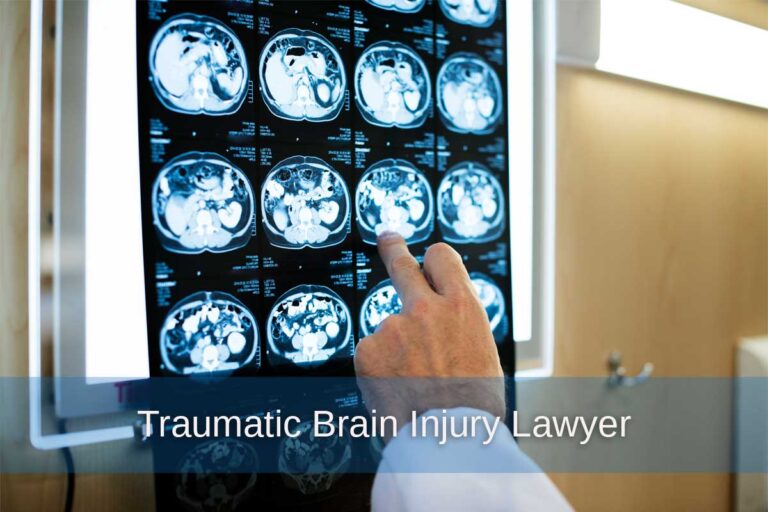Georgia Brain Injury Lawyer
Traumatic brain injuries (TBIs) are complex conditions that result from physical trauma to the brain, such as a blow, shock wave, or projectile impact. While the term “traumatic” may imply emotional distress, these catastrophic injuries primarily refer to the physical damage caused to the brain. TBIs can disrupt normal brain function temporarily or lead to permanent impairments, making them a significant health concern. If you or someone in your family suffered a traumatic brain injury due to someone else’s negligence, get in touch with a Georgia brain injury lawyer to guide your journey.
The repercussions of a serious TBI can be life-altering, requiring individuals to adapt to disabilities, relearn basic skills, and adjust their daily routines. Among the most common forms of TBIs are concussions, which vary in severity but can have substantial disruptive effects on a person’s life, even when classified as mild.
If another party’s negligence or wrongful actions cause a Traumatic Brain Injury, the injured party may pursue legal action to obtain compensation for the resulting damages. The Jewkes Law Firm assists injured Georgia residents navigate the complexities of personal injury claims arising from traumatic brain injuries. Contact us today at (770) 771-5130.

Suffering From A Traumatic Brain Injury? Contact Us For A Free Consultation
Suffering From A Brain Injury?
Understanding Brain Injuries: Causes, Symptoms, and Impacts
Brain injuries are a serious concern that can have lasting effects on an individual’s health and well-being. From brain aneurysms to blast injuries, these conditions can result from various factors and lead to significant consequences. Understanding the nuances of traumatic brain injuries and their implications is essential for promoting awareness, facilitating timely interventions, and supporting individuals affected by these challenging conditions. Let’s delve into the causes, symptoms, and impacts of brain injuries to gain a better understanding of these complex conditions.
What is a Traumatic Brain Injury?
A traumatic brain injury (TBI) is a severe condition that disrupts normal brain function and results from external forces. This is contrary to internal issues like strokes. Unlike many other bodily tissues, damaged brain tissue does not regenerate, leading to permanent loss of affected areas.
Given the brain’s role in controlling various functions like physical movement, emotions, senses, personality, and cognitive abilities, TBIs can profoundly impact individuals for life. TBIs manifest in diverse ways, ranging from mild concussions to irreversible brain damage. All TBIs can be categorized as either open or closed injuries, despite the variety.
Open TBIs involve skull fractures or penetrations such as gunshot wounds. In contrast, closed TBIs occur without skull breakage, commonly seen in cases of concussions. Closed TBIs represent the predominant category among traumatic brain injuries. Some common traumatic brain injuries include:
Concussion
A concussion results from a forceful impact that causes the brain to shake within the skull, potentially leading to bruising, nerve damage, or blood vessel injuries. While concussions are frequently mild and non-life-threatening, prompt diagnosis and treatment are crucial to prevent complications.
Carbon Monoxide Poisoning
Carbon monoxide, a lethal gas that displaces oxygen in the body, poses severe health risks by depriving tissues of vital oxygen supply.
Brain Aneurysm
A brain aneurysm is a swelling of a blood vessel in the brain, often triggered by trauma. This condition can exert pressure on brain tissues and nerves, resulting in symptoms like blurred vision and numbness. If a brain aneurysm ruptures, it becomes a life-threatening situation.
Brain Hemorrhage
Similar to a stroke, a brain hemorrhage occurs when an artery in the brain ruptures, causing internal bleeding that can be fatal or lead to permanent damage.
Blast Injuries
Blast injuries, commonly seen in military personnel, result from blunt force trauma caused by explosions. These injuries can affect both external and internal body parts, including the brain. Thus, highlighting the multifaceted impact of such traumatic events on individuals.
Closed Head Injuries
Closed head injuries, stemming from sudden impacts like collisions or falls, can cause significant harm to the brain without penetrating the skull. Understanding the dynamics of closed head injuries is crucial in addressing the associated challenges and implementing appropriate management strategies.

Shedding Light on Causes of Traumatic Brain Injuries
At The Jewkes Firm, LLC, we have handled many personal injury cases involving brain injuries for over a decade. The precise causes may vary from one instance to another. Howver, TBIs are predominantly the result of accidents or assaults that exert significant force on the head. In Georgia, brain injuries are frequently linked to various incidents, such as:
- Vehicular accidents (cars, trucks, motorcycles)
- Pedestrian or bicycle accidents
- Boating mishaps
- Workplace incidents
- Inadequate security leading to violent crimes
- Slip and fall accidents
- Sports-related injuries
- Falls from heights
- Assaults or violent attacks
- Impact from a solid object
- Exposure to blast waves, particularly in military contexts
Among these causes, vehicular accidents, especially involving unprotected individuals like motorcyclists, cyclists, or pedestrians, account for a significant portion of traumatic brain injuries (TBIs).
Suffering From A Traumatic Brain Injury? Contact Us For A Free Consultation
Suffering From A Brain Injury?
Recognizing Symptoms of Traumatic Brain Injury
The human brain, being the most intricate organ in the body, presents individuals with a diverse array of symptoms following traumatic brain injuries. These symptoms vary based on the nature and extent of the injury, as well as the specific region of the brain affected. It is crucial to be aware of the symptoms that may indicate a TBI, as prompt medical attention is essential for proper diagnosis and treatment.
In instances of mild traumatic brain injury (TBI), individuals may exhibit one or more of the following symptoms:
- Headaches
- Dizziness
- Temporary loss of consciousness
- Fatigue
- Nausea/vomiting
- Confusion
- Vision problems
- Sensitivity to light or sound
- Unusual changes in mood or behavior
- Changes in sleep habits
- Difficulties with concentration, focus, and/or memory
In addition, moderate to severe brain injuries may manifest through the following symptoms:
- Severe and persistent headaches
- Persistent nausea and vomiting
- Restlessness or agitation
- Severe or prolonged disorientation
- Loss of coordination
- Vision impairment
- Dilated pupils
- Extended loss of consciousness
- Convulsions or seizures
- Slurred speech
- Numbness or tingling in the limbs
It is crucial not to ignore any of these symptoms following a head injury, as they may indicate underlying issues that require immediate attention. It’s important to remember that symptoms may not always present immediately after the trauma, underscoring the need for ongoing monitoring.
Recognizing the common triggers of brain injuries can aid in preventive measures and timely interventions to mitigate risks and safeguard individuals from potential harm. It is crucial to be aware of the symptoms that may indicate a TBI, as prompt medical attention is essential for proper diagnosis and treatment.
Need a Free Consultation? Need a Skilled Attorney?
Free Consultation
Call (770) 771-5130
If you’ve been injured, you need to hire the best legal care to assist you with your claim. Get a FREE consultation today!
Understanding the Impact of Traumatic Brain Injuries
Any post-trauma symptoms, no matter how minor, should not be disregarded. Delayed onset of symptoms is also possible, underscoring the importance of monitoring one’s condition closely after a head injury.
Unfortunately, many individuals fail to seek medical help due to a lack of awareness about the warning signs. If you or a loved one experience any of these symptoms following an injury, prompt medical evaluation and legal consultation are critical steps to take.
As we unravel the intricacies of brain injuries, it becomes evident that early detection, timely intervention, and targeted care are pivotal in mitigating the impact of these conditions and promoting optimal recovery outcomes. By fostering awareness and understanding of brain injuries, we can enhance support systems and resources to empower individuals in their journey towards healing and rehabilitation.
Understanding the causes, symptoms, and impacts of brain injuries is crucial in raising awareness and promoting safety measures to prevent such incidents. Stay informed and prioritize brain health for a better quality of life.

GEORGIA PERSONAL INJURY LAWYER NEAR ME
How a Georgia Brain Injury Lawyer Can Help
Seeking legal guidance from a Georgia brain injury attorney can provide valuable support in navigating the complexities of pursuing compensation for TBI-related damages. The Jewkes Firm, with over a decade of experience in assisting Georgia residents, offers dedicated legal representation to ease the burden of legal proceedings for TBI victims.
By contacting The Jewkes Firm, individuals can access expert legal counsel to advocate for their rights and secure the compensation they deserve. Don’t hesitate to reach out for a complimentary consultation with a skilled local TBI lawyer to explore your options and protect your well-being.
To schedule a consultation, call (770) 771-5130 or visit our website to connect with a compassionate legal professional dedicated to helping TBI survivors in Georgia.
GET A FREE CASE REVIEW
PRACTICE AREAS
AREAS WE SERVE
Frequently Asked Questions?
Do I need a personal injury attorney?
The Jewkes Firm is well-versed in effectively challenging major insurance companies on your behalf to secure the highest settlement permissible by law. Our primary objective is to ensure your optimal recovery. It is only after this point that we assess the worth of your case.
What is the deadline for filing an injury case in Georgia?
The timeframe for filing an injury case, also known as the statute of limitations, can vary significantly. As per OCGA §9-3-33, you are granted a two-year period from the date of your injuries or the passing of a family member to initiate your personal injury claim.
What is the cost to hire a personal injury attorney?
There is no upfront cost associated with hiring a personal injury lawyer. Our fees are based on a percentage of your settlement, meaning you only pay if we successfully recover compensation. Our top priority is ensuring your well-being and helping you return to your normal life.
What damages can you recover from a personal injury?
A personal injury lawyer aims to establish negligence and seek restitution for the harm caused by the liable party. Additionally, you may be entitled to compensation for funeral costs, medical expenses, and income lost if you are a family member of someone who died as a result of an injury.
Free Case Evaluation












